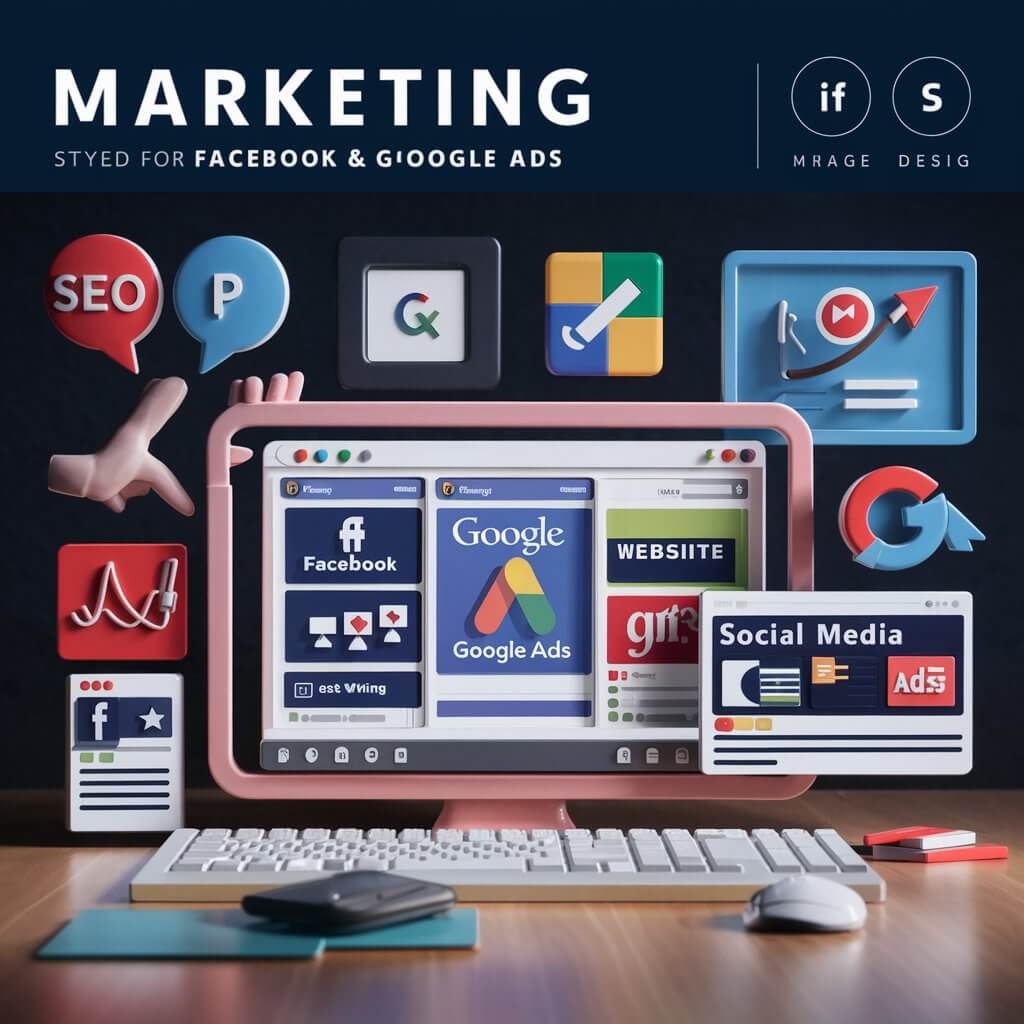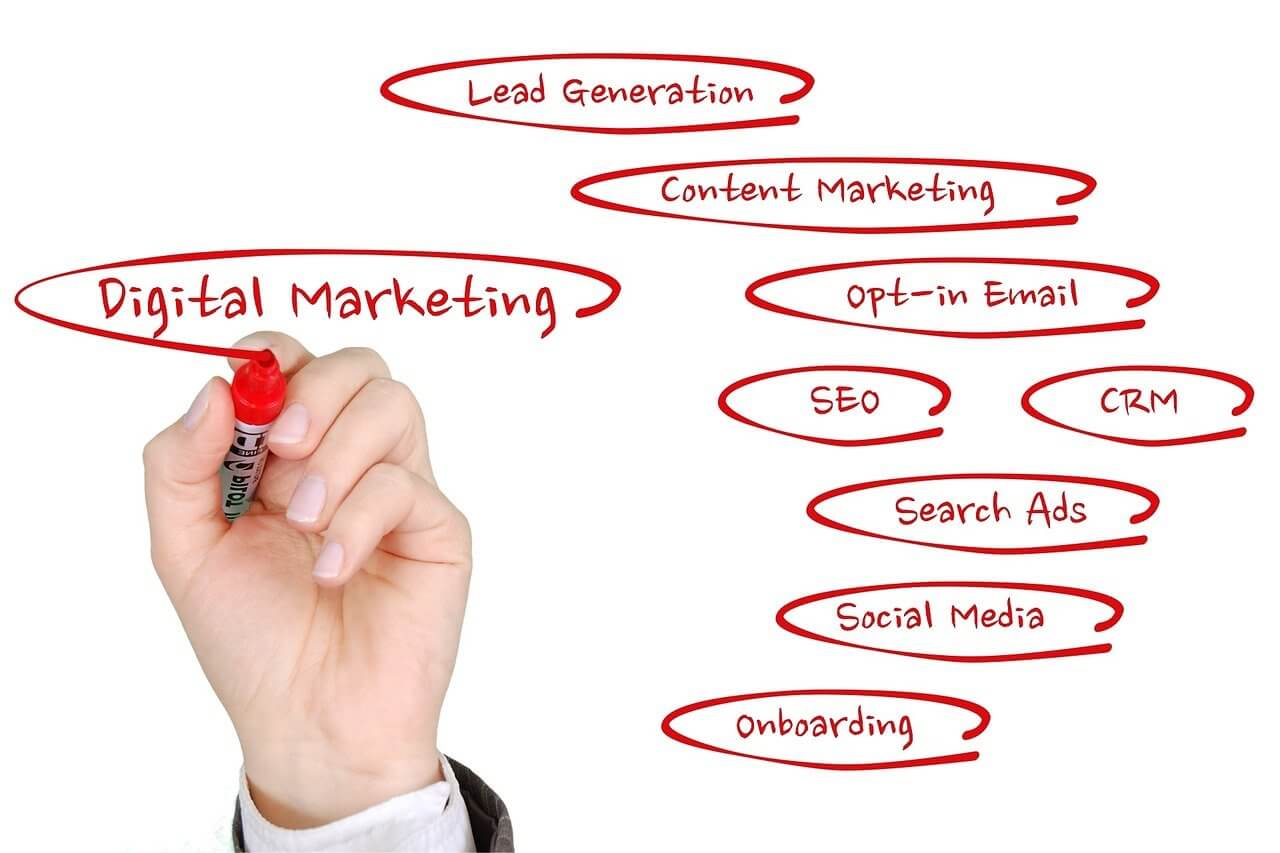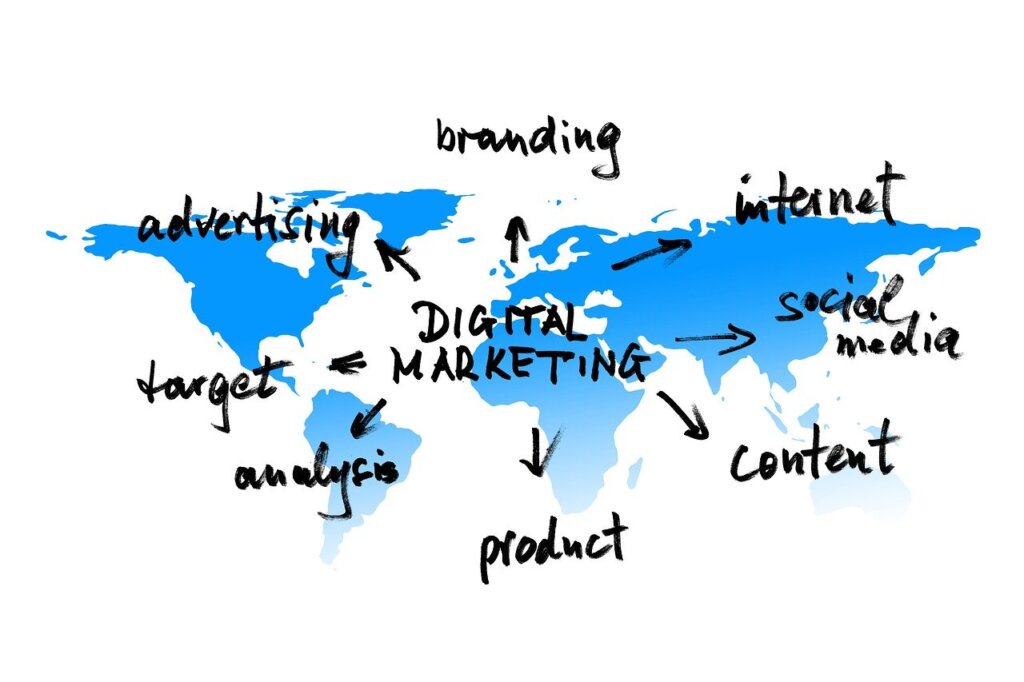
what is the digital marketing?
Digital marketing refers to the promotion of products, services, or brands using digital channels such as websites, search engines, social media, email, and mobile apps. In simple terms, it’s all about leveraging the internet and electronic devices to connect with potential customers.
One of the key aspects of digital marketing is its ability to reach a vast audience. Unlike traditional marketing methods that are often limited by geographical boundaries and time constraints, digital marketing allows businesses to engage with people worldwide at any time of the day. This global reach is facilitated by the widespread availability of internet-connected devices like smartphones, tablets, and computers.
In a nutshell, digital marketing leverages the power of the internet and digital tools to promote your business and connect with potential customers. Instead of billboards and flyers, it utilizes websites, social media, search engines, and email to reach your target audience.
Imagine a toolbox containing various online resources. One key tool is your website, your online headquarters where you showcase your offerings and convert visitors into customers.
Tools of Digital Marketing
Digital marketing relies heavily on various tools and platforms to implement and manage strategies effectively. These tools help businesses automate tasks, analyze data, optimize campaigns, and engage with their audience across different digital channels
.Digital marketing success hinges on having the right tools at your disposal. Unlike a traditional toolbox filled with physical implements, your digital marketing toolbox is stocked with online resources that help you reach your target audience and achieve your marketing goals
Here are some key tools commonly used in digital marketing:
important of digital marketing
Importance of Digital Marketing
Digital marketing tools play a crucial role in helping businesses execute, optimize, and measure their digital marketing efforts effectively. These tools facilitate various tasks and strategies across different digital channels, enabling businesses to achieve their marketing objectives efficiently. Here’s why these tools are important:
- Enhanced Efficiency and Productivity:
Digital marketing tools automate repetitive tasks such as scheduling social media posts, sending email campaigns, and generating reports. This automation saves time and allows marketing teams to focus on strategic activities that drive business growth. - Improved Targeting and Personalization:
Tools for analytics, CRM, and audience segmentation enable businesses to gather and analyze data about their target audience’s behavior, preferences, and demographics. This data-driven approach allows for personalized marketing campaigns tailored to specific customer segments, enhancing engagement and conversion rates. - Real-Time Monitoring and Optimization:
Analytics tools provide real-time insights into campaign performance, website traffic, and user behavior. Marketers can monitor key metrics such as traffic sources, bounce rates, and conversion rates, allowing them to quickly identify trends, adjust strategies, and optimize campaigns for better results. - Cost-Effectiveness and ROI Maximization:
Digital marketing tools offer scalable solutions that fit businesses of all sizes and budgets. Compared to traditional marketing methods, digital marketing channels like SEO, social media, and PPC advertising provide measurable ROI, allowing marketers to allocate budget resources more effectively based on performance data. - Comprehensive Campaign Management:
Integrated platforms and tools centralize campaign management across multiple channels, ensuring consistency in messaging and branding. This centralized approach simplifies workflow, facilitates collaboration between team members, and enables seamless coordination of marketing efforts. - Access to Global Markets:
With digital marketing tools, businesses can reach global audiences regardless of geographical location. Platforms like Google Ads, Facebook Ads, and international SEO strategies enable businesses to expand their market reach and attract customers from diverse cultural backgrounds and regions. - Customer Engagement and Relationship Building:
Tools for social media management, email marketing, and CRM systems facilitate ongoing communication and interaction with customers. By nurturing relationships through personalized content and timely responses, businesses can foster customer loyalty and advocacy. - Flexibility and Adaptability:
Digital marketing tools evolve with technological advancements and changing consumer behaviors. Marketers can experiment with new strategies, test different approaches, and adapt campaigns based on real-time data and market trends, ensuring relevance and competitiveness in the digital landscape. - Data Security and Compliance:
Many digital marketing tools adhere to data protection regulations such as GDPR and CCPA, ensuring secure handling of customer information. Compliance with these regulations builds trust with customers and mitigates risks associated with data breaches or misuse. - Continuous Learning and Innovation:
By using digital marketing tools, marketers can stay informed about industry trends, best practices, and emerging technologies. Continuous learning and innovation empower marketers to stay ahead of competitors, refine their skills, and leverage new opportunities for growth.
In essence, digital marketing tools empower businesses to streamline operations, drive targeted engagement, and achieve measurable results in today’s competitive digital landscape. By leveraging these tools effectively, businesses can maximize their marketing efforts, enhance customer experiences, and ultimately, drive sustainable business growth.
Challenges and Opportunities in Digital Marketing
Digital marketing presents both challenges and opportunities for businesses navigating the online landscape. These dynamics shape how companies strategize, engage with customers, and measure success in the digital age.
Challenges:
Ad Saturation: The proliferation of digital ads has led to ad fatigue among consumers, making it challenging for businesses to capture and maintain audience attention amidst the clutter.
Data Privacy Concerns: Stricter regulations and heightened consumer awareness regarding data privacy (e.g., GDPR, CCPA) require businesses to handle customer data responsibly and transparently, which can impact targeting and personalization efforts.
Rapid Technological Changes: Digital marketing tools and platforms evolve quickly, requiring continuous learning and adaptation to stay ahead of trends and competitors.
Measurement and ROI Complexity: Determining the true impact and ROI of digital marketing efforts across multiple channels can be complex due to the interconnected nature of online interactions and customer touchpoints.
Content Saturation: With the abundance of online content, businesses face the challenge of creating high-quality, engaging content that stands out and resonates with their target audience.
Opportunities:
Personalization: Advanced targeting capabilities allow businesses to deliver personalized experiences and messages based on customer data, enhancing engagement and conversion rates.
Automation: Marketing automation tools streamline workflows, improve efficiency, and enable personalized customer interactions at scale, freeing up time for strategic planning and creativity.
Data-Driven Insights: Analyzing big data provides valuable insights into customer behavior, preferences, and trends, enabling businesses to make informed decisions and optimize marketing strategies.
Emerging Technologies: Innovations like AI, machine learning, and augmented reality offer new avenues for creative marketing campaigns and personalized customer experiences.
Global Reach: Digital marketing transcends geographical boundaries, allowing businesses to reach a global audience and expand market presence without the constraints of physical location.
Navigating these challenges and capitalizing on opportunities requires businesses to adopt a proactive approach to digital marketing. By staying informed, leveraging advanced tools and technologies, and prioritizing customer trust and engagement, businesses can effectively navigate the complexities of digital marketing and drive sustainable growth in the digital era.

Exploring the Scope of Digital Marketing.
Digital marketing has evolved into a comprehensive ecosystem encompassing various strategies and channels that businesses leverage to connect with their target audiences online. From search engine optimization (SEO) to social media marketing, email campaigns, and beyond, digital marketing spans a wide array of tactics aimed at enhancing brand visibility, driving engagement, and ultimately, achieving business growth in the digital era.
- Search Engine Optimization (SEO): SEO focuses on optimizing websites to rank higher in search engine results pages (SERPs). By improving visibility and organic traffic from search engines like Google, businesses increase their chances of attracting relevant visitors and potential customers.
- Social Media Marketing: Social media platforms such as Facebook, Instagram, Twitter, and LinkedIn serve as powerful channels for brand promotion and customer engagement. Businesses use these platforms to share content, interact with followers, run targeted advertising campaigns, and build communities around their brands.
- Content Marketing: Content lies at the heart of digital marketing, encompassing blog posts, articles, videos, infographics, and more. High-quality, relevant content not only attracts and engages audiences but also helps establish thought leadership and authority in industry niches.
- Email Marketing: Email remains a cornerstone of digital marketing, enabling businesses to communicate directly with prospects and customers. Effective email campaigns deliver personalized messages, promotional offers, and valuable content to nurture leads and drive conversions.
- Pay-Per-Click (PPC) Advertising: PPC advertising allows businesses to bid for ad placement in search engines and partner websites. It’s a cost-effective way to drive targeted traffic to websites and landing pages, with businesses paying only when users click on their ads.
- Marketing Automation: Marketing automation tools streamline repetitive tasks such as email scheduling, social media posting, and lead nurturing. Automation not only saves time but also enables personalized customer interactions based on behavior and preferences.
- Analytics and Data-driven Insights: Analytics tools like Google Analytics provide valuable insights into website performance, user behavior, and campaign effectiveness. By analyzing data, businesses can make informed decisions, optimize marketing strategies, and improve ROI.
- Mobile Marketing: With the rise of smartphones and mobile apps, mobile marketing has become essential for reaching consumers on the go. Strategies include mobile-optimized websites, mobile apps, SMS marketing, and location-based advertising.
- Influencer Marketing: Collaborating with influencers who have large followings and credibility in specific niches can amplify brand reach and credibility among target audiences.
- Customer Relationship Management (CRM): CRM systems help businesses manage and analyze customer interactions throughout the customer lifecycle. Integrated with digital marketing efforts, CRM enhances personalized marketing campaigns and fosters customer loyalty.
In conclusion, the scope of digital marketing is vast and continually evolving with advancements in technology and shifts in consumer behavior. By leveraging diverse strategies and channels within digital marketing, businesses can adapt to changing landscapes, reach global audiences, and achieve their marketing goals effectively in today’s digital-first world.
conclusion of digital marketing.
How Digital Marketing Fuels Business Growth: A Deep Dive
Digital marketing acts as a powerful catalyst, propelling businesses towards growth in today’s digital landscape. Here’s a closer look at how effective digital strategies can supercharge your business across various aspects:
- Amplifying Brand Awareness:
Imagine your brand name lighting up across the internet. Digital marketing lets you reach a wider audience than ever before. Through targeted social media campaigns, informative blog posts, and strategic search engine optimization (SEO), you can get your brand seen by potential customers actively searching for products or services like yours. This widespread exposure builds brand recognition, making you a familiar and trusted name in the minds of consumers.
- Generating Leads: A Targeted Magnet
Digital marketing isn’t just about broadcasting your message; it’s about attracting the right audience. With tools like lead magnets (valuable content offered in exchange for contact information) and targeted advertising, you can attract potential customers actively interested in what you offer. This targeted approach generates high-quality leads, increasing the chances of converting them into paying customers.
- Driving Sales: From Awareness to Action
Digital marketing doesn’t stop at brand awareness or lead generation. It’s about driving sales and turning interest into action. By crafting compelling marketing campaigns that showcase your products or services and highlight their benefits, you can nudge potential customers towards making a purchase. This could involve retargeting website visitors with personalized ads, offering special discounts through email marketing, or creating urgency through limited-time promotions.
- Building Bridges with Customers: Fostering Engagement
Digital marketing allows you to break down traditional barriers and connect directly with your customers. Through interactive social media platforms, engaging content, and personalized email campaigns, you can foster two-way communication. This ongoing dialogue allows you to understand your customers’ needs and preferences better, address their concerns, and build stronger relationships that translate into loyalty.
- Enhancing Customer Satisfaction: A Digital Experience Advantage
Exceptional customer service is no longer limited to physical interactions. Digital marketing empowers you to provide exceptional customer experiences through online channels. By offering readily available FAQs, self-service options on your website, and responsive customer support via social media or chatbots, you can ensure a seamless and positive customer journey. Satisfied customers are more likely to become repeat buyers and recommend your brand to others.
- A Digital Edge: Gaining the Competitive Advantage
In today’s competitive market, standing out is crucial. Digital marketing equips you with the tools to differentiate your brand from the crowd. By showcasing your unique selling proposition through targeted campaigns, creating valuable and informative content that positions you as an expert, and actively engaging with your audience, you can carve a niche and establish a competitive advantage in the digital space.
By implementing effective digital marketing strategies, you can unlock a treasure trove of benefits that fuel business growth. From increased brand awareness and lead generation to driving sales, fostering customer engagement, and gaining a competitive edge, digital marketing offers a comprehensive approach to achieving your business goals in the digital age.
conclusion of digital marketing.
Digital marketing has revolutionized how businesses connect with customers. It’s not a passing fad, but a fundamental shift in marketing strategy. Here’s why:
Global Reach: Imagine transcending geographical limitations. Digital marketing allows you to connect with potential customers worldwide, opening doors to new markets and a vastly wider audience.
Measurable Impact: Unlike traditional marketing’s ambiguity, digital marketing offers precise measurement. You can track website traffic, analyze content engagement, and even pinpoint which campaigns drive sales. This data empowers you to constantly improve your strategy and optimize your budget for maximum impact.
Targeted Communication: Digital marketing isn’t a one-size-fits-all approach. You can tailor your message to resonate with specific demographics and interests, ensuring your message reaches the most receptive audience.
Relationship Building: Digital marketing fosters two-way communication. By creating valuable content and interacting with your audience online, you build trust and establish your brand as an authority. This fosters brand loyalty and positions you favorably against competitors.
Cost-Effectiveness: Compared to traditional methods, digital marketing can be significantly more affordable. This makes it a powerful tool, especially for small businesses, to compete on a larger scale.
In conclusion, digital marketing is not just a marketing tactic; it’s a comprehensive strategy for business growth in the digital age. By leveraging its power, businesses can connect with a wider audience, build stronger relationships, and ultimately achieve their marketing goals.

